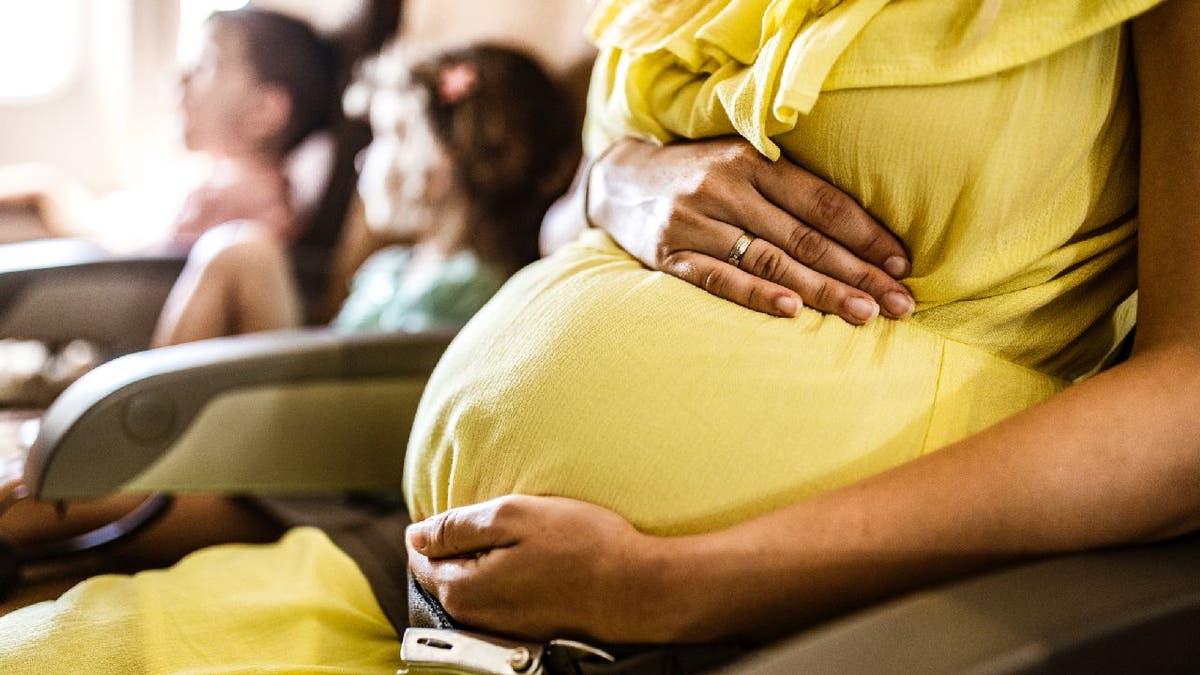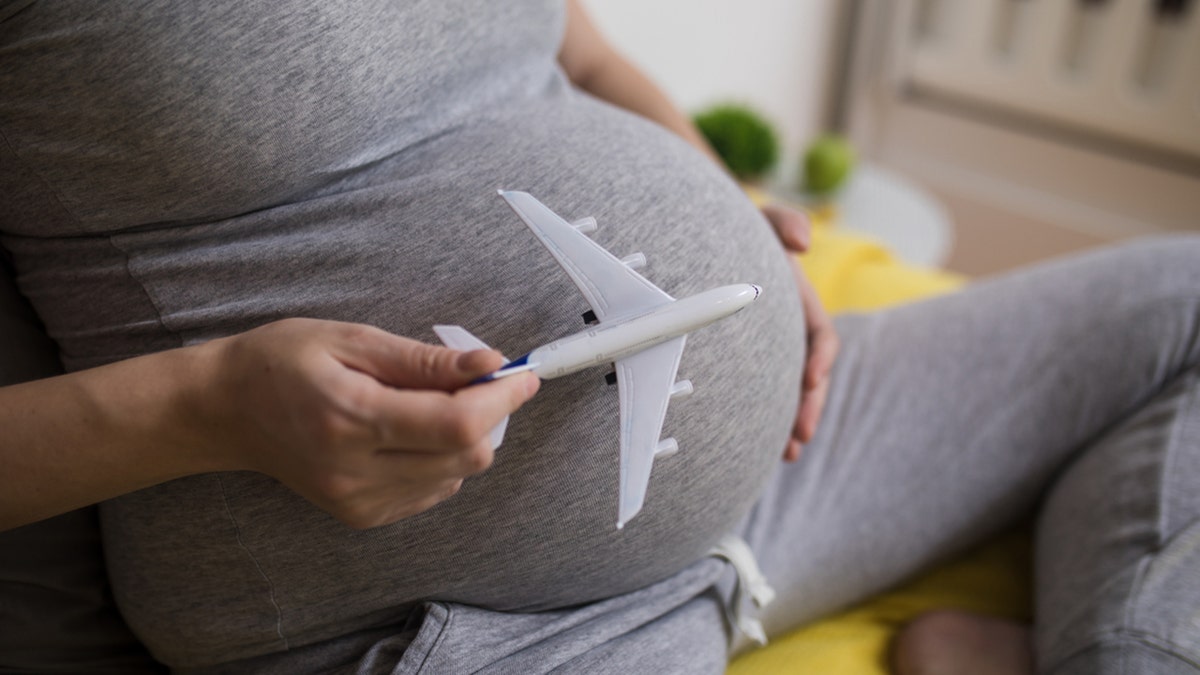Fox News Flash top headlines for October 27
Fox News Flash top headlines are here. Check out what's clicking on Foxnews.com.
A woman from Connecticut who gave birth on a flight to the Dominican Republic in September has returned to U.S. earlier this month after getting an emergency passport for her newborn.
Kendria Rhoden of Hartford delivered her son Skylen on an American Airlines flight, according to a series of viral TikTok videos her sister, Kendalee Rhoden, posted, which have garnered millions of views.
Kendria Rhoden and her child were able to board a return flight home in early October, according to the TikTok videos posted.
BABY NAMES THAT ARE REPORTEDLY BANNED IN AMERICA: WHAT TO KNOW
"On Sept. 8, American Airlines flight 2443 from New York (JFK) to Punta Cana (PUJ) declared an emergency before landing due to a medical emergency on board," an American Airlines representative wrote to Fox News Digital in an email.
"First responders met the flight upon landing and the customer was taken to a local hospital for further evaluation. We thank our team members and medical professionals on board for their professionalism and quick action," the airline rep continued.
Rhoden and her sister shared TikTok videos of Skylen’s red emergency passport and both videos have drawn questions from curious social media users who want to know what it’s like to give birth while traveling internationally.
Fox News Digital reached out to Rhoden for comment. It's unclear as to how far along she was in her pregnancy.
Here’s what pregnant women should know before making long-distance travel plans and what needs to be done if, by chance, they give birth in the sky, in international waters or in a foreign country.
What to know about emergency passports and other documents?

Passports are an important travel document that are usually required for international trips. (iStock)
New mothers who give birth on a plane or boat while traveling internationally have to report the birth to the U.S. embassy or consulate in the country of their arrival, according to Dr. Jessica Madden, medical director at Aeroflow Breastpumps, a breast pump distributor based in Asheville, North Carolina.
Embassies and consulates will issue a Consular Record of Birth Abroad (CRBA) form, which will need to be filled out to prove a newborn’s citizenship status.
"As long as you are a U.S. citizen, your baby will also be a U.S. citizen, no matter where he or she is born," Madden said. "Certain countries will offer dual citizenship if the plane was flying over their country when you gave birth, but others will not."
UKRAINE, A LEADING SURROGACY DESTINATION, IS CAUGHT AMID WAR: WHAT TO KNOW
CBRAs take approximately 15 business days to process, according to the U.S. Embassy & Consulate government website.
Passports are required for international travel and reentering the country.
The U.S. Department of State’s Bureau of Consular Affairs handles emergency passport processing, including life-or-death emergency appointments that require international travel within three days and urgent travel appointments that require international travel within 14 days.
"Newborns who are born abroad do need to have an emergency U.S. passport issued to be able to enter the U.S., unless they are born on a cruise that both leaves from and returns to the U.S. [in a] closed loop," Madden said.
WOMAN GIVES BIRTH ON 11-HOUR UNITED AIRLINES FLIGHT
CBRAs and emergency passport applications for newborns are usually processed at the same time, according to Madden.
She noted that newborns must be present during these document appointments, which is a requirement that could delay the process if a baby isn’t quickly discharged from a hospital.

Doctors and airlines advise women who are in the late stages of pregnancy to avoid air travel. (iStock)
"There is a potential that your stay might need to be extended by several weeks," Madden warned.
Madden noted that expecting mothers who need to travel internationally during their third trimester should check obstetric care terms with their health insurer to see if a birth abroad will be covered.
Pregnancy complications associated with preterm birth
- Pre-eclampsia
- Gestational diabetes
- Cervical incompetence
"I recommend having a copy of your pregnancy medical record readily available. This is important information to have with you if you give birth in a foreign country," Madden said. "You should try to plan ahead of time where you will seek medical treatment if you go into labor or develop an unforeseen pregnancy complication."
FLORIDA WOMAN, 8 MONTHS PREGNANT, POLESPEARS FISH FOR POTENTIAL WORLD RECORD CATCH
Women who have pregnancy complications that are associated with a higher risk of preterm birth should avoid traveling internationally during the entire third trimester, according to Madden.
What are the logistics of traveling while pregnant?

Some pregnant women choose to go on a "babymoon" vacation before they give birth. (iStock)
Airlines and cruise lines have a "no-travel deadline for pregnant passengers," according to Sandra McLemore, a travel industry expert and television host with 22 years of experience, who currently contributes to Travel Marketing and Media, a California-based travel business firm.
"Within the airline industry, it can vary between domestic airlines and international airlines," McLemore told Fox News Digital.
"If, for example, you were flying to Europe for your babymoon, you'd need to check each airline. Getting across the pond and then being denied boarding to your next destination would be terrible," she continued.
Cruise lines, on the other hand, are known to adjust their own rules depending on the itinerary, according to McLemore.
"The risks are higher when a ship has a significant number of sea days away from land," she said. "Typically, you'll see earlier pregnancy deadlines on transatlantic or transpacific routes."
CAN YOU TAKE PRENATAL VITAMINS WHEN YOU'RE NOT PREGNANT?
McLemore said pregnant women should follow the advice an obstetrician gives before making travel plans.

Airlines and cruise lines have travel restrictions and guidelines for pregnant passengers. (iStock)
Doctors may approve of short trips or outright advise against travel (domestically and internationally), especially when mothers are in a later stage of pregnancy, McLemore noted.
"At the end of the day, a healthy baby and healthy mother are the focus," she said.
If travel while pregnant can’t be avoided for whatever reason, McLemore said expecting mothers should consult a travel insurance company – provided that they have one.
BABY FORMULA SHORTAGE: WHICH FOODS AND TECHNIQUES BOOST BREAST MILK PRODUCTION?
"Most travel insurance policies do not cover any form of pregnancy complications, which means that if you require medical treatment or repatriation, you could be hundreds of thousands of dollars out of pocket," McLemore warned.
What do doctors want pregnant women to know about travel?

Medical experts all agree that pregnant women should consult their obstetrician before they make long-distance travel plans. (iStock)
The "best time to travel during pregnancy" is between 14 and 28 weeks, according to the American College of Obstetricians and Gynecologists (ACOG), a Washington, D.C.-based professional association of obstetric physicians.
The group notes that "mid-pregnancy" is the best time for expecting mothers to travel because morning sickness and energy levels generally improve.
"You are still able to get around easily," the group wrote in a travel information guide. "After 28 weeks, it may be harder to move around or sit for a long time."
CAN YOU TAKE PRENATAL VITAMINS WHEN YOU'RE NOT PREGNANT?
The ACOG urges pregnant women to consult their obstetrician before travel and to be wary of travel if they’re experiencing pregnancy complications.
Why are air and sea travel a concern?
Dr. Kellie Lease Stecher, an obstetrician at Minnesota Women's Care, a healthcare center in Maplewood, Minnesota, said each pregnancy is unique and therefore recommendations can vary when it comes down to travel.
"If an individual is in their first trimester, but [they're] having bleeding concerns, it would be best to stay home. However, patients can travel internationally until 32 weeks," Stecher told Fox News Digital.
WOMAN GIVES BIRTH ON FRONTIER AIRLINES FLIGHT, GIVES DAUGHTER FITTING NAME
Some airlines require letters from a physician before they allow pregnant women board, Stecher noted.

Planes have less space and fewer medical personnel (if there's any onboard at all) to handle the delivery of a child. (iStock)
"The concern about planes or cruises, is the inability to easily get off and go to a hospital," she explained, "If you’re in the air and have an emergency, there are limited tools at your disposal."
Stecher doesn’t recommend international travel for expecting mothers who are nearing term.
If travel can’t be avoided, she suggests mothers-to-be contact the country they’re visiting to "see what they do legally."
CLICK HERE TO GET THE FOX NEWS APP
Having the information ready can help to make a backup or emergency birthing plan.
What are the risks of traveling while pregnant?
Dr. Wendy Goodall McDonald, an obstetrician-gynecologist at Women's Health Consulting, a healthcare center in Chicago, said she advises "low-risk" patients to avoid international travel in their third trimester and "high-risk" patients to stop traveling earlier than that.
"If there is a complication, not only is the pregnant person subject to whatever health system is present where they are, but if the baby were to be born early, they now have a preterm newborn who has to remain in that health system until they are old enough to be discharged, which could be months," Goodall McDonald told Fox News Digital.

Traveling during the early gestational period is generally viewed as safe, but there are still some risks. (iStock)
"The same is true earlier than the third trimester, but statistically, complications are less likely to occur in the second trimester or earlier," she added.
FOLLOW US ON FACEBOOK FOR MORE FOX LIFESTYLE NEWS
Traveling for extended periods – four hours or more – with restricted movement while pregnant also puts women at risk of developing a blood clot, or deep vein thrombosis (DVT), which can be life-threatening, according to Goodall McDonald.
She said expecting mothers should "get up and move every two to four hours" to lower their chance of developing blood clots.

Pregnant women should consider all their options before they plan travel by air or sea. (iStock)
"Cruises often have medical personnel present, but there may be limitations to where further care will occur if needed," Goodall McDonald said. "Air travel will allow a person to get to a destination faster than a car or bus in the event that acute care is needed, but if driving or riding a train or bus is the only option, the pregnant person should be aware of what hospitals or health systems are along their route if needed."
CLICK HERE TO SIGN UP FOR OUR LIFESTYLE NEWSLETTER
Goodall McDonald also noted that with domestic travel, "hospital transfers and family visitation may be more possible" based on where the pregnant woman is.


